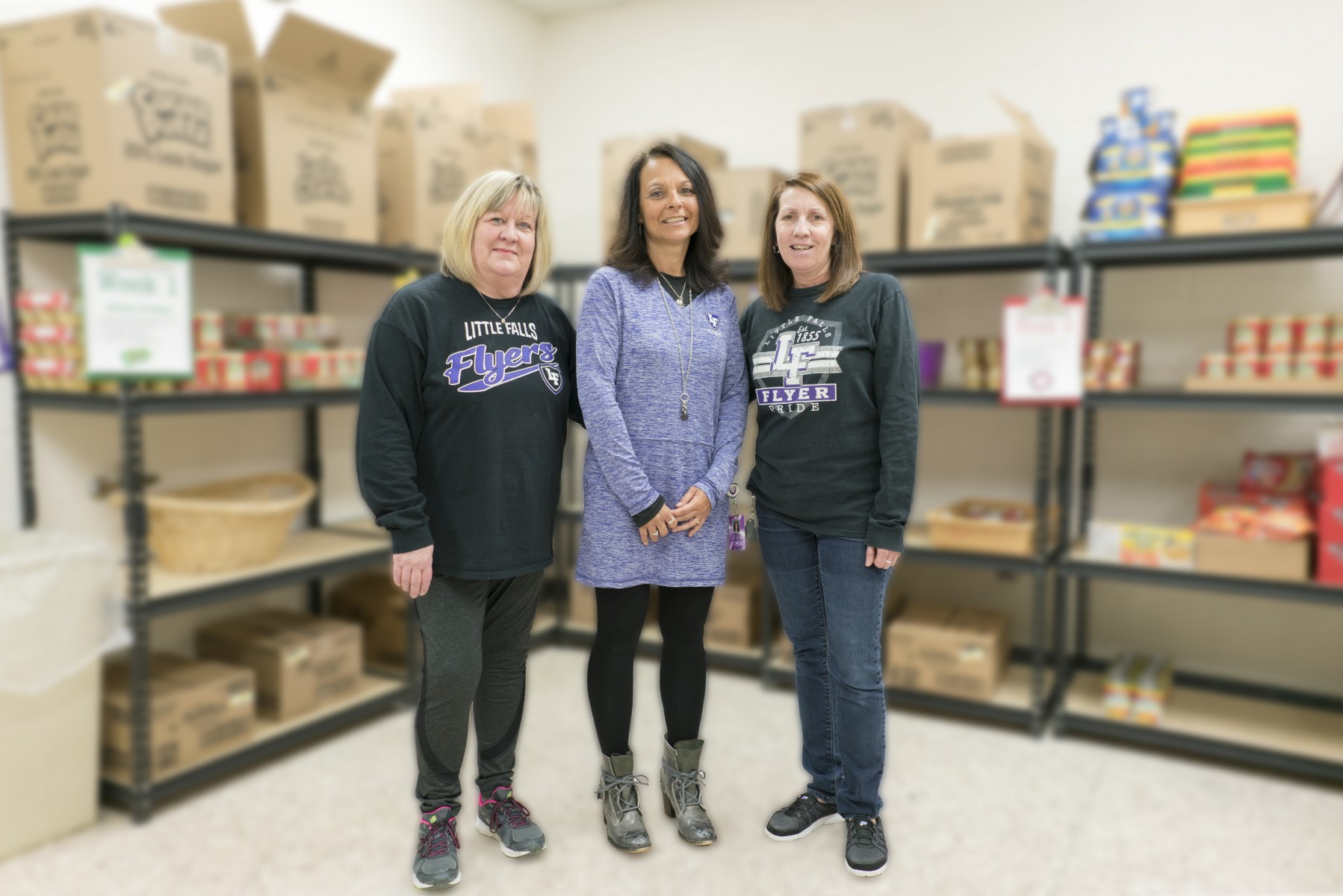Filling Backpacks and Bellies
Three Little Falls educators initiate a life-changing food program for kids facing food insecurity
By Jenny Holmes
In the Little Falls Community School District alone, an average of 46 percent of students receive free or reduced lunch, with the largest percentage occurring at one of Little Falls' elementary schools where over 60 percent of children in kindergarten through fifth grade are eligible for the federal program.
Staggering statistics like these were part of the motivation behind three Little Falls district employees' decision to begin a program to change the lives, and fill the bellies, of hundreds of students.
Anita Larsen, School Social Worker at Lincoln Elementary in Little Falls and Dr. S.G. Knight Elementary in Randall, was one of the team of three who initiated the Flyer Pride Pack Weekend Food Program three years ago.
“As educators, Cindy, Laura, and I saw students whose families were struggling with food insecurity,” says Larsen. “We had observed, or were made aware of, students looking to the food sharing bowl for extra food to take home for evening meals and weekend food.”
Larsen and fellow educators, Laura DeChaine and Cindy Casillas, were well aware of the numbers that were stacked up against their young learners.
“We know we have a high percentage of both poverty and unemployment in Morrison County,” Larsen noted. “Also, the rate of free and reduced lunch in the district showed a need.”
In 2015, the three began initial research of the impact of hunger on learning and engagement.
“We knew by offering this program in our district it would help students function better at school when they didn't have to worry about being hungry,” says Larsen. “That's really why we chose to do the program.”
The three women researched similar existing programs and found a few in the state that they really connected with.
“We took some of the models out there and made it unique to our district,” she says. “For example, food doesn't go into specifically marked bags. We don't want students identified by their peers as taking home a food pack.”
In 2016, implementation of the Flyer Pride Pack Weekend Food Program began providing children identified as ‘at-risk of weekend hunger’ with a pack of food that is nutritious, nonperishable, and easy to prepare.
Each Flyer Pride Pack is valued around $5.25 and includes seven healthy meals for the weekend, with two breakfast items, two lunch items, three entrees, two snacks, and fruit. It costs $200 each school year to provide food packs to a single student.
In its first year alone, 1,844 bags of food were distributed over the 36 weeks of the school year. This year, 65 children receive Pride Packs each week, with plans to increase those numbers as the need, and funding, allows.
The food is ordered monthly through the Walmart store in Little Falls, a school district food vendor, and CHI St Gabriel's Health. It's paid for with grants, company and individual donations, foundations, service clubs, and others. Food items are also donated from the district's food service department and Ruby's Pantry, a nonprofit organization that procures and distributes surplus food and goods to help fight poverty throughout Minnesota and Wisconsin.
On a weekly basis, bags are packed by Little Falls High School students. Food items for a given week are on a clearly labeled shelf, and black tubs are identified for each school with the number of bags needed written on the lid.
“This has been a great partnership opportunity with our high school students to learn organization and job skills as they pack the bags,” says Larsen.
After the food is delivered by custodial staff to each building, classroom teachers discreetly deliver the bags of food to students by placing them either in their backpack or their locker.
The impact of filling backpacks and bellies has been life-changing.
Since the program's implementation, teachers in the Little Falls School District have reported improvements in test scores, positive behavioral gains, and a decrease in the number of unexcused absences.
Larsen says the program was initially approved and funded by the Alternative Career Pathways program instituted in several school districts throughout Region 5. Innovation Funding from Sourcewell, in turn, provides the financial support behind ACP to help educators get special programs like this off the ground.
ACP funding provided two years of revenue to compensate the team for their time. Today Larsen, DeChaine, and Casillas all donate their time outside of the school day to keep the program going. The three have devoted much of that time researching partnership development, fundraising, grant writing, and spreading community awareness.
Larsen and her education partners say they're grateful to the ACP committee at Little Falls School District, as well as Sourcewell, for the funding that helped launch this program.
“It has been an amazing journey with much more to be done, but we are filling tummies,” she says.
Sourcewell (formerly National Joint Powers Alliance) is a self-supporting government organization, partnering with education, government, and nonprofits to boost student and community success. Created in 1978 as one of Minnesota's nine service cooperatives, we offer training and shared services to our central-Minnesota members. Throughout North America, we offer a cooperative purchasing program with over 300 awarded vendors on contract. Sourcewell is driven by service and the ability to strategically reinvest in member communities.

